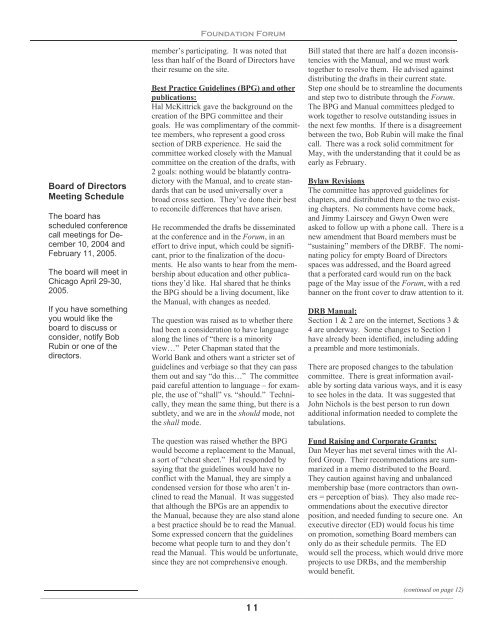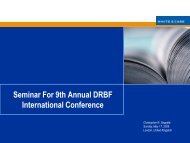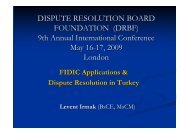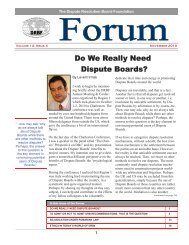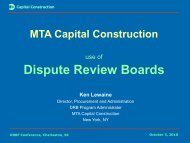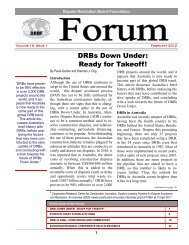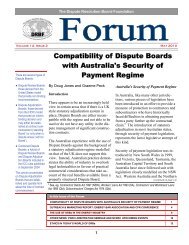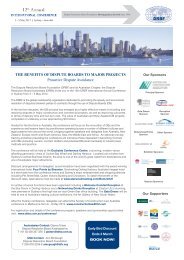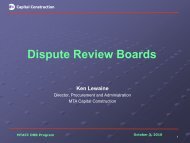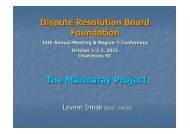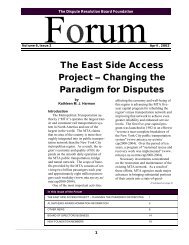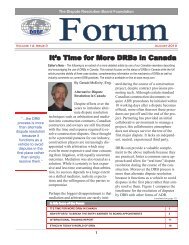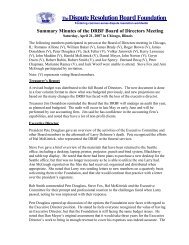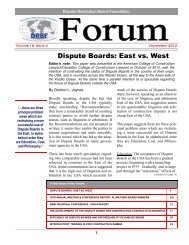DRBF NAMES EXECUTIVE DIRECTOR - Dispute Resolution Board Foundation
DRBF NAMES EXECUTIVE DIRECTOR - Dispute Resolution Board Foundation
DRBF NAMES EXECUTIVE DIRECTOR - Dispute Resolution Board Foundation
You also want an ePaper? Increase the reach of your titles
YUMPU automatically turns print PDFs into web optimized ePapers that Google loves.
<strong>Board</strong> of Directors<br />
Meeting Schedule<br />
The board has<br />
scheduled conference<br />
call meetings for December<br />
10, 2004 and<br />
February 11, 2005.<br />
The board will meet in<br />
Chicago April 29-30,<br />
2005.<br />
If you have something<br />
you would like the<br />
board to discuss or<br />
consider, notify Bob<br />
Rubin or one of the<br />
directors.<br />
<strong>Foundation</strong> Forum<br />
member’s participating. It was noted that<br />
less than half of the <strong>Board</strong> of Directors have<br />
their resume on the site.<br />
Best Practice Guidelines (BPG) and other<br />
publications:<br />
Hal McKittrick gave the background on the<br />
creation of the BPG committee and their<br />
goals. He was complimentary of the committee<br />
members, who represent a good cross<br />
section of DRB experience. He said the<br />
committee worked closely with the Manual<br />
committee on the creation of the drafts, with<br />
2 goals: nothing would be blatantly contradictory<br />
with the Manual, and to create standards<br />
that can be used universally over a<br />
broad cross section. They’ve done their best<br />
to reconcile differences that have arisen.<br />
He recommended the drafts be disseminated<br />
at the conference and in the Forum, in an<br />
effort to drive input, which could be significant,<br />
prior to the finalization of the documents.<br />
He also wants to hear from the membership<br />
about education and other publications<br />
they’d like. Hal shared that he thinks<br />
the BPG should be a living document, like<br />
the Manual, with changes as needed.<br />
The question was raised as to whether there<br />
had been a consideration to have language<br />
along the lines of “there is a minority<br />
view…” Peter Chapman stated that the<br />
World Bank and others want a stricter set of<br />
guidelines and verbiage so that they can pass<br />
them out and say “do this…” The committee<br />
paid careful attention to language – for example,<br />
the use of “shall” vs. “should.” Technically,<br />
they mean the same thing, but there is a<br />
subtlety, and we are in the should mode, not<br />
the shall mode.<br />
The question was raised whether the BPG<br />
would become a replacement to the Manual,<br />
a sort of “cheat sheet.” Hal responded by<br />
saying that the guidelines would have no<br />
conflict with the Manual, they are simply a<br />
condensed version for those who aren’t inclined<br />
to read the Manual. It was suggested<br />
that although the BPGs are an appendix to<br />
the Manual, because they are also stand alone<br />
a best practice should be to read the Manual.<br />
Some expressed concern that the guidelines<br />
become what people turn to and they don’t<br />
read the Manual. This would be unfortunate,<br />
since they are not comprehensive enough.<br />
Bill stated that there are half a dozen inconsistencies<br />
with the Manual, and we must work<br />
together to resolve them. He advised against<br />
distributing the drafts in their current state.<br />
Step one should be to streamline the documents<br />
and step two to distribute through the Forum.<br />
The BPG and Manual committees pledged to<br />
work together to resolve outstanding issues in<br />
the next few months. If there is a disagreement<br />
between the two, Bob Rubin will make the final<br />
call. There was a rock solid commitment for<br />
May, with the understanding that it could be as<br />
early as February.<br />
Bylaw Revisions<br />
The committee has approved guidelines for<br />
chapters, and distributed them to the two existing<br />
chapters. No comments have come back,<br />
and Jimmy Lairscey and Gwyn Owen were<br />
asked to follow up with a phone call. There is a<br />
new amendment that <strong>Board</strong> members must be<br />
“sustaining” members of the <strong>DRBF</strong>. The nominating<br />
policy for empty <strong>Board</strong> of Directors<br />
spaces was addressed, and the <strong>Board</strong> agreed<br />
that a perforated card would run on the back<br />
page of the May issue of the Forum, with a red<br />
banner on the front cover to draw attention to it.<br />
DRB Manual:<br />
Section 1 & 2 are on the internet, Sections 3 &<br />
4 are underway. Some changes to Section 1<br />
have already been identified, including adding<br />
a preamble and more testimonials.<br />
There are proposed changes to the tabulation<br />
committee. There is great information available<br />
by sorting data various ways, and it is easy<br />
to see holes in the data. It was suggested that<br />
John Nichols is the best person to run down<br />
additional information needed to complete the<br />
tabulations.<br />
Fund Raising and Corporate Grants:<br />
Dan Meyer has met several times with the Alford<br />
Group. Their recommendations are summarized<br />
in a memo distributed to the <strong>Board</strong>.<br />
They caution against having and unbalanced<br />
membership base (more contractors than owners<br />
= perception of bias). They also made recommendations<br />
about the executive director<br />
position, and needed funding to secure one. An<br />
executive director (ED) would focus his time<br />
on promotion, something <strong>Board</strong> members can<br />
only do as their schedule permits. The ED<br />
would sell the process, which would drive more<br />
projects to use DRBs, and the membership<br />
would benefit.<br />
(continued on page 12)<br />
———————————————————————————————————————————————————<br />
11


